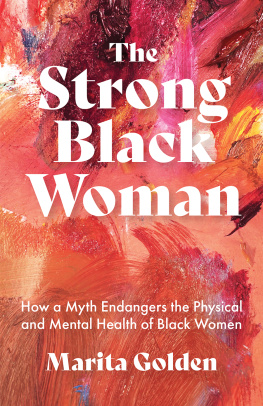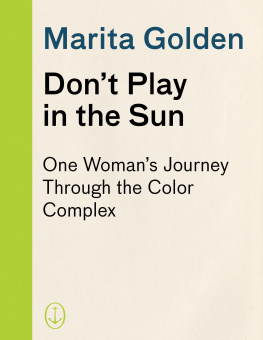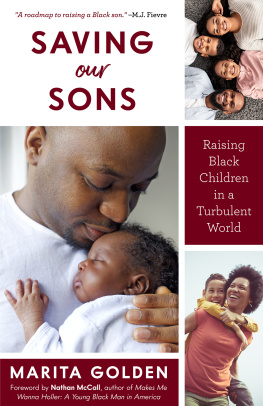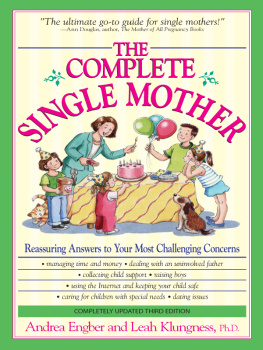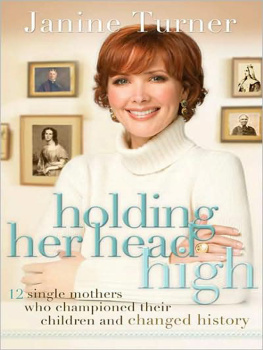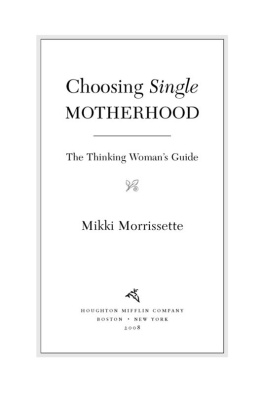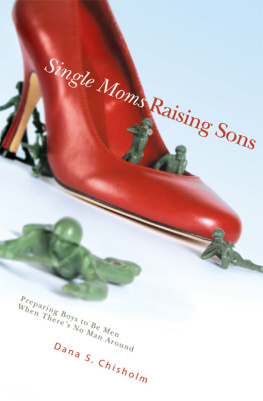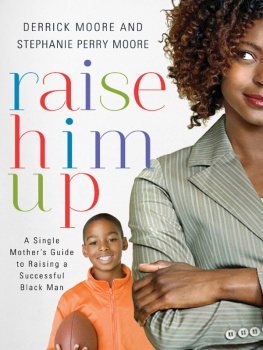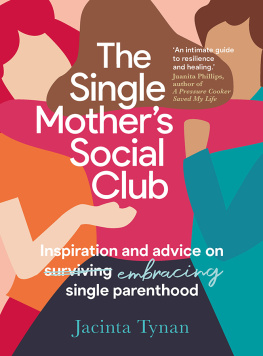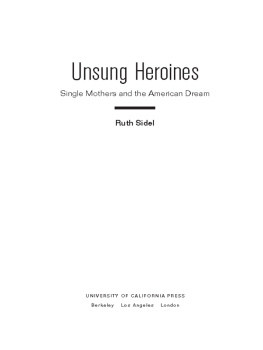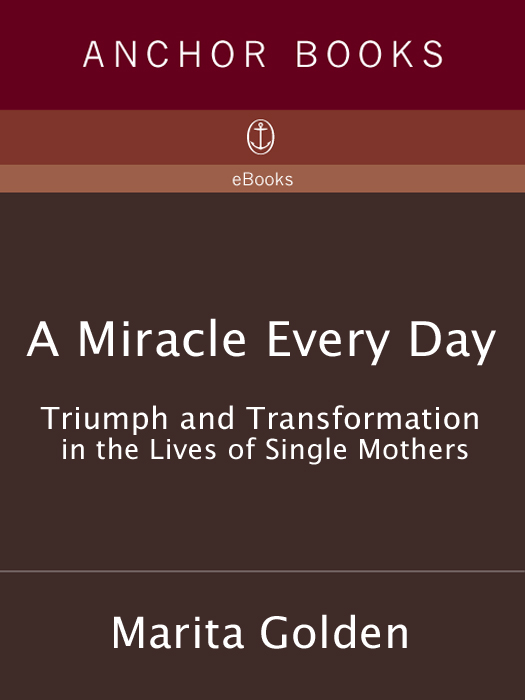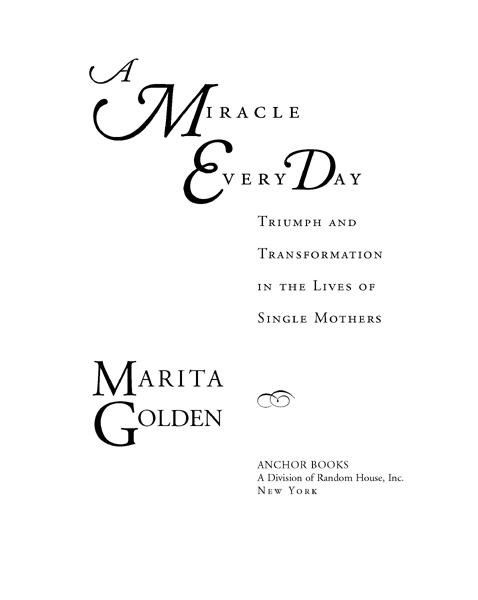A LSO BY M ARITA G OLDEN
Wild Women Dont Wear No Blues
And Do Remember Me
Long Distance Life
A Womans Place
Migrations of the Heart
Saving Our Sons
Skin Deep
The Edge of Heaven
ANCHOR BOOKS EDITION
Copyright 1999 by Marita Golden
All rights reserved. Published in the United States by Anchor Books, a division of Random House, Inc., New York, and in Canada by Random House of Canada Limited, Toronto.
Anchor Books and colophon are registered trademarks of Random House, Inc.
From A Creation Story, Janet Maloney Franze, which appears in CHILD OF MINE, edited and copyright 1997 by Christina Baker Kline. Reprinted with permission by Hyperion.
Library of Congress Cataloging-in-Publication Data
Golden, Marita.
A miracle every day: triumph and transformation in the lives of single mothers / b Marita Golden.
p. cm.
1. Single mothers. 2. Single-parent family. 3. Children of single parents. I. Title.
HQ759.915.G63 1999
306.8743dc21 98-30942
eISBN: 978-0-307-79476-5
www.anchorbooks.com
v3.1
For Michael
Contents
A MIRACLE EVERY DAY

I always wanted to be a mother. To one child. And I was not afraid to raise that child alone. I planned to be a mother one day, even at the age of twenty-two, while living in New York City and studying at the Graduate School of Journalism at Columbia University and daily discovering and reconfiguring my ambition. I would be a mother, even if I had to do it alone.
This yearning was intertwined, quite compatibly and quite logically, it seemed to me, with the determination to write and to explore and claim as much of the world as I could. And through some act monumental or minuscule, I would, as well, contribute to the progress of my people, and maybe even of the world. Race-woman with a baby at her breast, the fingers of her free hand resting on the typewriter keys. The image filled me not with fear but with greedy anticipation. I secretly knew, even then, that to have a child was a profoundly important act of narration. Yet I never felt that the story I would write as mother would subvert the articles I was writing then and the books that lay in wait.
A child is a chronicle. As in any saga, the one composed by mother and child revises assumptions and unsettles the too-neat line of demarcation we often draw between what is possible and what is real. Motherhood offered me another way into the world, even as it demanded and required everything and then forced me, like a weary scavenger, to search for still more. Honor thy mother, thy father, thy child.
My own mother was unprepared and, she once confessed to me, absolutely amazed when she became pregnant with me at forty-two. It was in the summer of my nineteenth year that my mother told me she had never thought of aborting me, although her relationship with my father was turbulent and I was an unplanned child. This secret history spilled forth in the aftermath of my revelation that I feared I was pregnant and was thinking of having an abortion. As a counternarrative, my mother told me that I was a child who became, once my existence was confirmed, retroactively longed-for and totally desired. The year of my birth, my mother owned several boarding houses, played and often won at the numbers, drove her own Pontiac, and frequently hosted parties that featured marathon games of poker and bid whist on the first floor, and games of craps in the basement of the houses she owned.
As we sat on my mothers chenille-covered four-poster the day I spoke of a pregnancy I feared, and my mother of a pregnancy she embraced, she recalled, nonetheless, with chagrin and a pain she could not camouflage, how her friends teased her about her middle-aged pregnancy. Years later, after I had become a mother, I searched through all the black and white photos of my family in vain for a picture of my mother pregnant. There were cracked and aged pictures of my mother lying on a blanket on the sand of some segregated beach with friends, or standing before her mothers modest house on McConnell Road in Greensboro, North Carolina, in the summer when she came to take me home to Washington after Id spent six weeks with Granny Reid. And there was the three-by-five black and white photo of her guiding my five-year-old hand in the cutting of a cake at my first big birthday party, a picture I always searched for first each time I opened the album. But there were no photos of my mother, a large woman, made larger still because her body was filled with me.
Those nine months were not (as far as I know) captured on film and, by the snapping of the lens, honored, legitimized, saved. The body of a pregnant woman is lauded as a temple in cultural mythology, yet evokes the oddest, most intense mixture of obsession and revulsion. The body supposedly held sacred is vulnerable to blatant assessment and even mockery. The body of a woman with child sometimes seems to belong to everyone in the world, really, but her. When I failed to find any photos of my mother pregnant, I searched through my own photo album and found none of me carrying my son. Is this erasure, or willful amnesia, or a conspiracy to somehow obliterate the act that perhaps more than any other defines the lives of so many women, women like my mother, women like me? The stiff pages of the photo album I kept in honor of the family my husband and I had created held scores of christening pictures, dozens of photos that captured every moment of my sons growth; but the bulky, weighty, foreign body that had been the site of the most astonishing incubation was nowhere framed or frozen in time by either me or my mother.
I did not want the child I feared I carried at nineteen. I was still in college and had cast myself, and been cast by the cultural eruptions of that time, as an unalterably modern woman. Controlling my fate was everything to me. I was young, filled with the hubris and vanity of the young, and thought controlling my destiny was purely a matter of determination. I wanted a child when I could make promises to that child, and to myself, that I was sure I could keep.
If I had an abortion it would not have been an illegal, possibly lethal operation, the kind my mother had described to me as common for many of the women of her generation. I could walk openly into a legal clinic. I could safely and freely make an appointment for a qualified doctor to abort my child. My mother argued against the abortion I was considering, if I was indeed pregnant. In fact, my period was horribly, uncharacteristically late, but I was not pregnant. My mothers relationship with my father often sapped much of what was strong and pure and beautiful in her. Still, as she later recalled, when she knew that she was pregnant, It never occurred to me to have an abortion because I thought if I did, Id be denying the world someone who might do great things. What if I killed a scientist, a doctor, someone who could make the world a better place? My mother asked this question rhetorically, but with an arc of emotion that in its strength echoed the feelings of nearly twenty years earlier. I would never forgive myself, she concluded.
Some may hear in those words an elitist valuation of human life. What if my mother had aborted a being who grew into a man or woman known only for the unremarkable nature of their life, someone who steadfastly shunned the extraordinary? Wasnt that a life worth saving too? But what I hear in my mothers plea are the awesome expectations she possessed. She was a black woman in 1950, carrying a child for whom she could predict and assert only the ability to amaze, to act upon and in the world in powerful, positive ways.


